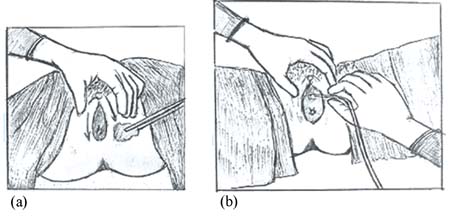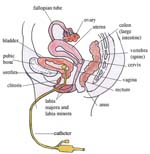22.4.2 Steps in the catheterisation procedure
What is the first thing you should do before you open any of the sterile equipment packages?
Wash your hands thoroughly with soap and water for at least 15 seconds.
Once your patient is prepared and informed and your equipment is ready, put on the sterile or very clean gloves and clean around the woman’s vulva and perineal area with antiseptic solution or alcohol, starting from the urethral opening and swabbing outwards (Figure 22.8a). If you don’t have antiseptic solution, clean the area thoroughly with soap and water.

Why do you think it is important to clean the area starting with the urethral opening and swabbing outwards?
This avoids wiping germs from the perineal area towards the urethral opening; they could be carried inside when the catheter is inserted.
Use your non-dominant hand to carefully pull back the labia majora to fully expose the urethral opening. (You may wish to look back at the detailed drawing of the female external genitalia in Figure 3.2 in Study Session 3.) Lubricate the 16FC catheter if you have proper lubricant (don’t use anything else) and slowly insert the catheter into the urethral opening (Figure 22.8b).
Once well into the bladder, you will see urine flowing out through the end of the catheter. Use the syringe to inject 5 ml of sterile water into the tube leading to the catheter balloon; this makes the balloon swell up and anchors the catheter in the bladder so it won’t pull out when the patient moves (see Figure 22.9). Pull on the catheter very gently to feel the resistance.

Then connect the catheter to the sterile drainage tubing so the urine flows into the collecting bag. Make sure the collecting bag is placed below the level of the bladder, or the urine will not flow into it. If you do not have a sterile collecting bag, then let the urine drain into a very clean container. This is called an ‘open’ system and it carries a bigger risk of infection passing up the drainage tube and into the bladder. Ideally, the drainage should be a ‘closed’ system with the urine draining into a sterile bag.
As soon as you have completed the procedure, refer the woman to a higher health facility as quickly as possible. Go with her if you can.
22.4.1 Bladder catheterisation equipment
